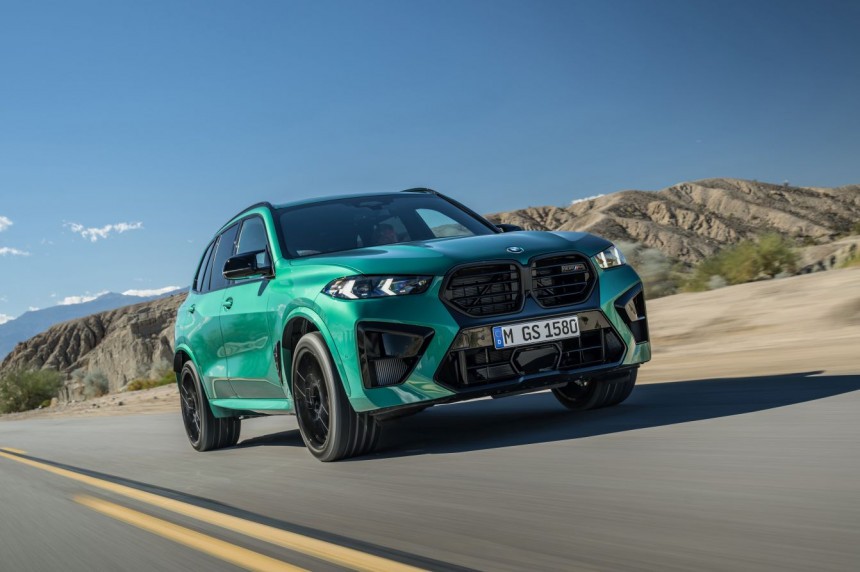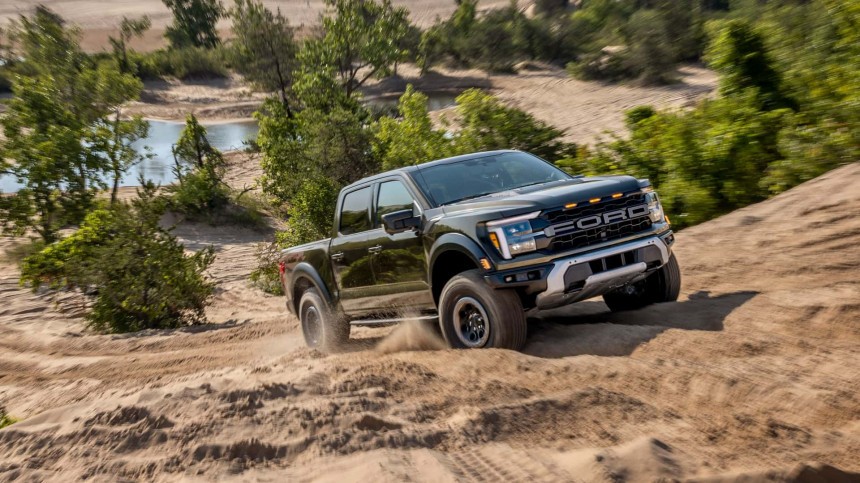Today, most European nations have a green flashing beacon on their head. European Union (EU) member states are making a strong push against global warming, which upset farmers quite badly. That's why they started protesting in January. But those strict measures are joined at the hip with new financial pressure put on owners of heavy and polluting cars. For example, living in France with an SUV or a high-performance vehicle has gotten unexpectedly expensive in 2024. The US could follow in the Hexagon's footsteps. Some Americans are already pretty vocal about it.
2024 started with a bang over the pond. Besides the issues brought forward by inflation, some businesses had to adapt to new rules. Farmers were especially outraged by the measures. They staged tractor blockades, burned tires, and threw manure on some administrative buildings to underline their disagreement with the revamped EU agricultural policies.
The bloc wants to become climate-neutral by 2050. Farming produces around 11% of the EU's total greenhouse gas emissions. So, decision-makers saw it fit that 4% of the arable land should no longer be used for crops. Besides that, farmers should also reduce fertilizer use by 20% minimum and not plant the same crop on the same plot of land every year.
While those measures might have been gradually applied, the renewed EU policy also allowed for more competition with farmers from outside the bloc because of new free-trade agreements.
French agronomists were the most upset about these changes, but peers from Germany, Belgium, Italy, and Greece joined them as well. Eventually, the protests moved to Brussels, Belgium, where the EU Commission (imagine it like a sort of supranational government that doesn't have much power) is headquartered.
The EU officials caved for the time being and agreed to eliminate the fertilizer reduction rule.
Last year, buying a vehicle that emitted 141 g of CO2 per km (224 g of CO2 per mi) meant the owner had to pay an extra tax of €1,000 ($1,075). That was besides the regional (based on hp and CO2 figures) and weight levies. Then, there's the value-added tax of 20%. Yes, it was already pretty pricey to buy something like a BMW M3 or an Audi SQ5 in the country that used to be Napoleon Bonaparte's home.
Starting this year, French new car buyers are looking at a tax of around €1,100 ($1,183) for the same vehicle with emissions of 141 g of CO2 per km. Then, if the vehicle weighs more than 1,600 kg (3,527 lb), they'll have to pay €10 ($11) for every extra kg.
A V8-powered 2024 BMW X5 M Competition has a starting cost of €159,300 ($171,209) with the VAT included. If the car is registered in Paris (Île-de-France region), there's an extra tax of €1,358 ($1,460). Then, emissions of 295 g of CO2 per kilometer attract another tax of €60,000 ($64,493). It's not over.
On top of all that, there's the weight levy. The high-performance SUV weighs 2,410 kg (5,313 lb). That's another €17,330 ($18,628).
So, someone buying a brand-new base-spec BMW X5 M Competition in France this year would spend €237,988 ($255,841) in total.
Fortunately, pickup trucks, all-electric vehicles, and hydrogen-powered cars are excluded from this new tax scheme – for now. Starting in 2025, buyers of heavy plug-in hybrids like the BMW XM 50e will pay almost the same taxes.
Don't even think about mentioning fueling. It's much cheaper than what the French are paying. When writing, the average price of gas in Montana is $2.9 per gallon, which amounts to $0.7 per liter. The French pay $1.9 per liter. That's $7.1 a gallon.
Sadly, spending more money doesn't stop with the abovementioned taxes for those born or living in the Hexagon who like or want cool cars. Cities can also impose whatever regulations they desire, too. And it just happened in Paris! The inhabitants voted to triple parking fees for internal combustion engine-powered vehicles weighing more than 1,600 kg (3,527 lb) and all-electric vehicles weighing more than 2,000 kg (4,409 lb).
Thus, Europe's best-selling car – the Tesla Model Y – will avoid the revamped parking fees (once implanted) in rear-wheel-drive form (1,909 kg / 4,209 lb), but won't escape them if it has two motors instead of one (2,003 kg / 4,416 lb).
After the referendum outcome becomes public policy, Model Y Long Range owners will pay:
Residents will enjoy special fees to park near their homes, but going to a restaurant or an event cancels that perk. They'll pay the full rate. If you plan on visiting Paris with a rented crossover SUV, beware of these incoming charges. They're not official at the time of writing, but the current administration will see to making them a reality.
If it seems a bit absurd to charge so much for parking and apply such high taxes for heavy cars, bear in mind that Paris also has a rule regarding older vehicles that want to enter the city. You'll need a €3.6 ($3.9) sticker that confirms your ride is eligible to enter France's capital. Don't worry; you'll only have to buy it once. However, driving an ineligible vehicle or without the sticker incurs an automatic fine of €68 ($73) per entrance.
Since news broke about what the Parisians decided, netizens expressed their support on various social media platforms. Some Americans (and Canadians, surprisingly) stated they would support higher levies and bigger parking fees for larger and polluting cars.
Assuming those harsh taxes could somehow work federally, the reality is that they wouldn't do much for public health and the environment. Last year, the top three best-selling vehicles in the US were Ford, Chevy, and Ram pickup trucks. If America were to follow France's lead, they would all be excluded from The fourth was the Rav4, which weighs a smidge under 1,600 kg (3,527 lb). That's a no-go, as well.
But the issue at hand isn't that Americans love pickup trucks. It's the culture, the urban planning, and the lack of reliable public transit. Paris has everything you can imagine in this department. Visitors and inhabitants can use the subway, buses, trams, and other means of transport like taxis or scooters to move inside a city that isn't all about parking spaces. In the US, even employers ask if you own a car. You can't escape it if you're not really well-off.
But besides all that, the personal vehicle is often associated with being independent and free. You go wherever you want, whenever you want. It's probably why some states allow youngsters to obtain a learner's permit as soon as they turn 14 years old.
Figuring out a way through which we could minimize road transport pollution would be great. However, it can't happen through more taxation and higher parking fees. People need and deserve reliable alternatives before being asked to drive less. Today, we would rather make one-lane car tunnels than invest in high-speed rail.
Europeans may force themselves to champion a green movement and risk upsetting farmers and car owners while doing so. Americans cannot. Not right now, at least.
The bloc wants to become climate-neutral by 2050. Farming produces around 11% of the EU's total greenhouse gas emissions. So, decision-makers saw it fit that 4% of the arable land should no longer be used for crops. Besides that, farmers should also reduce fertilizer use by 20% minimum and not plant the same crop on the same plot of land every year.
While those measures might have been gradually applied, the renewed EU policy also allowed for more competition with farmers from outside the bloc because of new free-trade agreements.
French agronomists were the most upset about these changes, but peers from Germany, Belgium, Italy, and Greece joined them as well. Eventually, the protests moved to Brussels, Belgium, where the EU Commission (imagine it like a sort of supranational government that doesn't have much power) is headquartered.
Upsetting everyone at once isn't usually a good idea
However, the French were also hit with new car taxes, and these new levies weren't only targeting the affluent. Although it's not explicitly mentioned that it's an anti-SUV measure, which would have made the "Tire Extinguishers" very happy, the structure puts more pressure on owners of all high-riding vehicles, including hybrids and plug-in hybrids.Last year, buying a vehicle that emitted 141 g of CO2 per km (224 g of CO2 per mi) meant the owner had to pay an extra tax of €1,000 ($1,075). That was besides the regional (based on hp and CO2 figures) and weight levies. Then, there's the value-added tax of 20%. Yes, it was already pretty pricey to buy something like a BMW M3 or an Audi SQ5 in the country that used to be Napoleon Bonaparte's home.
Starting this year, French new car buyers are looking at a tax of around €1,100 ($1,183) for the same vehicle with emissions of 141 g of CO2 per km. Then, if the vehicle weighs more than 1,600 kg (3,527 lb), they'll have to pay €10 ($11) for every extra kg.
A V8-powered 2024 BMW X5 M Competition has a starting cost of €159,300 ($171,209) with the VAT included. If the car is registered in Paris (Île-de-France region), there's an extra tax of €1,358 ($1,460). Then, emissions of 295 g of CO2 per kilometer attract another tax of €60,000 ($64,493). It's not over.
So, someone buying a brand-new base-spec BMW X5 M Competition in France this year would spend €237,988 ($255,841) in total.
Fortunately, pickup trucks, all-electric vehicles, and hydrogen-powered cars are excluded from this new tax scheme – for now. Starting in 2025, buyers of heavy plug-in hybrids like the BMW XM 50e will pay almost the same taxes.
Few are spared
To put all those figures better into perspective, US buyers living in states like Montana, Oregon, and Alaska pay $122,300 (€113,733) if they can snatch the SUV at MSRP. The only other car-related tax they have to worry about? Registration. That's it.Don't even think about mentioning fueling. It's much cheaper than what the French are paying. When writing, the average price of gas in Montana is $2.9 per gallon, which amounts to $0.7 per liter. The French pay $1.9 per liter. That's $7.1 a gallon.
Sadly, spending more money doesn't stop with the abovementioned taxes for those born or living in the Hexagon who like or want cool cars. Cities can also impose whatever regulations they desire, too. And it just happened in Paris! The inhabitants voted to triple parking fees for internal combustion engine-powered vehicles weighing more than 1,600 kg (3,527 lb) and all-electric vehicles weighing more than 2,000 kg (4,409 lb).
Thus, Europe's best-selling car – the Tesla Model Y – will avoid the revamped parking fees (once implanted) in rear-wheel-drive form (1,909 kg / 4,209 lb), but won't escape them if it has two motors instead of one (2,003 kg / 4,416 lb).
- €18 ($19.3) per hour for parking for one to three hours in the first 11 districts;
- €29.25 ($31.45) per hour for parking for four hours in the first 11 districts;
- €34.25 ($36.83) per hour for parking for five hours in the first 11 districts;
- €37.50 ($40.33) per hour for parking for six hours in the first 11 districts;
- €12 ($13) per hour for parking for one to two hours in the remaining eight districts;
- €16 ($17.21) per hour for parking for three hours in the remaining eight districts;
- €19.5 ($21) per hour for parking for four hours in the remaining eight districts;
- €22.8 ($24.52) per hour for parking for five hours in the remaining eight districts;
- €25 ($26.88) per hour for parking for six hours in the remaining eight districts.
Residents will enjoy special fees to park near their homes, but going to a restaurant or an event cancels that perk. They'll pay the full rate. If you plan on visiting Paris with a rented crossover SUV, beware of these incoming charges. They're not official at the time of writing, but the current administration will see to making them a reality.
If it seems a bit absurd to charge so much for parking and apply such high taxes for heavy cars, bear in mind that Paris also has a rule regarding older vehicles that want to enter the city. You'll need a €3.6 ($3.9) sticker that confirms your ride is eligible to enter France's capital. Don't worry; you'll only have to buy it once. However, driving an ineligible vehicle or without the sticker incurs an automatic fine of €68 ($73) per entrance.
The US would if it could, but it can't so it won't
Now, it's time for the tough question. Should the US do the same? Could all 50 states implement such stringent measures against car owners? Would politicians prioritize fighting congestion, pollution, and global warming by discouraging the use of personal cars?Since news broke about what the Parisians decided, netizens expressed their support on various social media platforms. Some Americans (and Canadians, surprisingly) stated they would support higher levies and bigger parking fees for larger and polluting cars.
Assuming those harsh taxes could somehow work federally, the reality is that they wouldn't do much for public health and the environment. Last year, the top three best-selling vehicles in the US were Ford, Chevy, and Ram pickup trucks. If America were to follow France's lead, they would all be excluded from The fourth was the Rav4, which weighs a smidge under 1,600 kg (3,527 lb). That's a no-go, as well.
But besides all that, the personal vehicle is often associated with being independent and free. You go wherever you want, whenever you want. It's probably why some states allow youngsters to obtain a learner's permit as soon as they turn 14 years old.
Figuring out a way through which we could minimize road transport pollution would be great. However, it can't happen through more taxation and higher parking fees. People need and deserve reliable alternatives before being asked to drive less. Today, we would rather make one-lane car tunnels than invest in high-speed rail.
Europeans may force themselves to champion a green movement and risk upsetting farmers and car owners while doing so. Americans cannot. Not right now, at least.

















